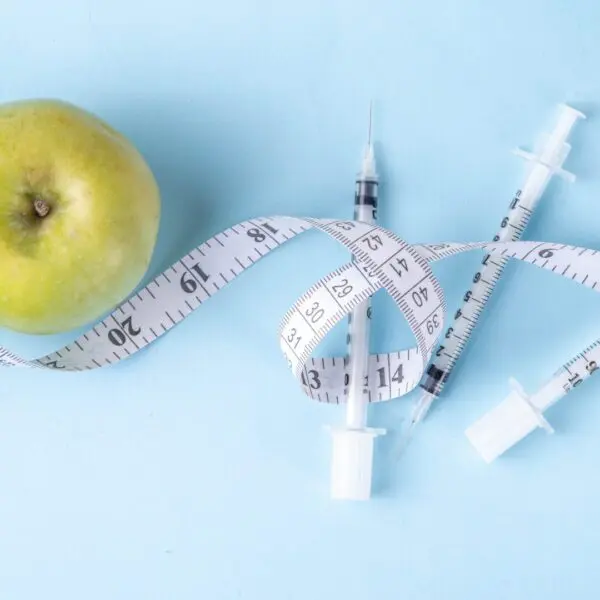We recently incorporated Men’s Health into our arsenal of treatments at PUR-FORM. Regardless of the area of health we are focusing on at PUR-FORM, we stress science behind all of our methods. Given our range of new offerings, I wanted to dive into the science of a topic that is often overlooked: the impact of mouthwash and toothpaste on men’s health.
For years, concerns have been raised about the potential dangers of certain ingredients in toothpaste and fluoride mouthwash. While these products are staples in most daily oral hygiene routines, emerging research suggests that some of the compounds found in these products may have negative side-effects, specifically linked to hormone disruption, lowered testosterone levels in men, and impaired nitric oxide production. Triclosan can potentially disrupt the production of nitric oxide (NO) in the body by interfering with the nitrate-nitrite-nitric oxide pathway. Nitric oxide is produced from nitrates that we consume from vegetables. Nitrates are converted to nitrites by bacteria on the tongue, and then nitrites are converted to nitric oxide when mixed with saliva. This nitric oxide production helps kill pathogens on the skin and provides other beneficial effects. Using antibacterial mouthwashes or toothpastes containing triclosan can disrupt this pathway by killing the beneficial bacteria on the tongue that convert nitrates to nitrites. A study showed that brushing with triclosan toothpaste did not significantly affect nitric oxide, nitrite, or nitrate levels compared to regular toothpaste. This is likely because the triclosan did not penetrate deep enough into the tongue’s crevices to kill the nitrate-reducing bacteria. However, the widespread use of triclosan in consumer products means most people have detectable levels in their bodies, which could potentially interfere with nitric oxide production over time. In summary, while triclosan toothpaste alone may not significantly impact NO production, the ubiquitous exposure to triclosan from various products raises concerns about its ability to disrupt this important nitrate-nitrite-NO pathway in the body. so the bottom line is do not use these products.
The Endocrine Disrupting Culprits
Taking a closer look at the ingredients, there are two key culprits in many mainstream toothpastes and mouthwashes that raise concerns – fluoride and triclosan. Both ingredients have been identified as potential endocrine disruptors, meaning they can interfere with the body’s natural hormonal functions.
Fluoride’s Effects on Testosterone
Fluoride is a familiar ingredient in toothpaste and is widely present in drinking water. It is often praised for its role in preventing cavities, however, research suggests a potential downside for men’s health. Studies have linked fluoride exposure to decreased testosterone levels and other reproductive concerns in males. One survey of fluoride workers found a dose-dependent relationship between fluoride exposure and low testosterone levels: the higher the exposure, the lower the testosterone levels. Similarly, another study observed a similar decrease in testosterone levels among men participants who drank fluoridated water.
Triclosan Troubles
Triclosan, a common antibacterial agent found in many toothpastes and mouthwashes, has also raised concerns. Triclosan has been shown to disrupt testosterone production and reproductive hormones in animal studies. Research also points towards a potential link between prenatal exposure to triclosan and worsened male fertility issues.
Impaired Nitric Oxide Production
The potential downsides of certain toothpaste and mouthwash ingredients extend beyond hormone disruption. Fluoride and triclosan may also hinder the body’s production of nitric oxide (NO). Nitric oxide is a crucial signaling molecule with a wide range of functions, including regulating blood flow, blood pressure, immune response, and even erectile function in men. Studies suggest that triclosan can disrupt NO production in human endothelial cells (cells lining blood vessels), while chronic fluoride exposure in rats has been linked to decreased NO levels and high blood pressure. This impairment of NO production could exacerbate existing health issues such as high blood pressure, atherosclerosis, and erectile dysfunction. Routine mouth and oral tissue exposure to endocrine disruptors and NO inhibitors like fluoride and triclosan may cause them to be absorbed into the bloodstream and disrupt delicate hormonal processes and cardiovascular health. For men already experiencing low testosterone or erectile dysfunction, this could worsen symptoms. While maintaining healthy nitric oxide levels is vital for overall well-being, some everyday products might unknowingly deplete our body’s natural supply.
Triclosan’s Effect on Endothelial NO
Studies suggest triclosan disrupts nitric oxide (NO) production in the cells that line our blood vessels (endothelial cells). One lab study showed triclosan decreased the production of an enzyme – endothelial nitric oxide synthase (eNOS), and NO production in human endothelial cells. This impaired endothelial NO generation can contribute to endothelial dysfunction, a condition linked to atherosclerosis, high blood pressure, heart disease, and other cardiovascular issues. Endothelial dysfunction driven by reduced NO bioavailability can also impact blood flow to organs and contribute to erectile dysfunction in men.
How Fluoride Might Affect Testosterone
Fluoride toothpaste can decrease testosterone production in several ways:
- Direct Impact on Testosterone-Producing Cells: Fluoride might directly affect Leydig cells, crucial for testosterone production. Research suggests exposure to sodium fluoride, commonly found in toothpaste, may significantly decrease the number of these cells and hinder their function.
- Hormonal Imbalance: The body has a complex system for regulating testosterone levels. Fluoride disrupts the hypothalamic-pituitary-testicular axis, essential for regulating those levels. Hormonal imbalance due to fluoride exposure can lead to abnormal sex hormone levels, including lowered testosterone levels.
- Low Serum Testosterone Levels: Some studies on animals and humans have shown an association between higher fluoride exposure from toothpaste and other sources and lower serum testosterone levels. Men with higher levels of fluoride in their urine tended to have lower testosterone compared to others.
- Indirect Effects on Fertility: There’s a possibility that fluoride might indirectly affect testosterone by impairing sperm structure and function. Excessive fluoride exposure could potentially lead to changes in sperm quality and function.
While the research is ongoing, there are some possible explanations for how fluoride might influence testosterone production. Reducing exposure to fluoride toothpaste might be a way to help maintain testosterone levels in men, but it’s important to consult with a healthcare professional before making any changes to your oral hygiene routine.
Offset the Adverse Effects of Fluoride
Dietary Choices
Pack your plate with antioxidant-rich foods like berries, leafy greens, and citrus fruits. These antioxidants can help combat oxidative stress that might be caused by fluoride. Consume foods rich in magnesium, zinc, and vitamin C as deficiencies in these nutrients can worsen fluoride’s potential negative effects. Drink green tea, which contains compounds like epigallocatechin gallate (EGCG) that may offer protection against fluoride-induced oxidative damage.
Herbal Remedies
Consider using natural mouthwashes made with herbs like cloves, rosemary, and Oregon grape root. These herbs hold antimicrobial and anti-inflammatory properties, supporting oral health without the potential concerns associated with some conventional ingredients. Certain spices and herbs can also be helpful. Adding cinnamon to your diet and incorporating holy basil (tulsi) into your meals may reduce fluoride absorption and accumulation in the body.
Supplements
Beyond dietary adjustments, some supplements may offer additional support. Consider taking antioxidant supplements like vitamins E and C, along with alpha-lipoic acid. These can help counteract oxidative stress potentially caused by fluoride exposure. Calcium and magnesium supplements may also be beneficial, as they can help reduce fluoride absorption and accumulation in the body. Additionally, including a probiotic supplement can help maintain a healthy gut microbiome, which fluoride exposure might disrupt. It’s important to note that consulting with a healthcare professional before starting a new supplement is crucial to ensure they’re right for you and don’t interact with any medications you’re currently taking.
While the focus of this article has been on reducing fluoride exposure, another potential strategy involves supporting your body’s natural nitric oxide production. Here’s where nitric oxide supplements like Neo40, and others from HumanN (a company specializing in nitric oxide stimulators and other cardiovascular supplements) come in. A nitric oxide stimulator like Neo40 may help offset some adverse effects of fluoride exposure from toothpaste and mouthwash. Neo40 is a patented formula containing ingredients like beetroot powder, hawthorn berry extract, L-citrulline, and sodium nitrite, all of which contribute to increased nitric oxide (NO) production through the eNOS (endothelial nitric oxide synthase) pathway. Think of these pathways as computer software, and the organs and cells as the computer hardware.
Fluoride has been shown to inhibit eNOS activity and decrease NO production. By stimulating NO synthesis, Neo40 may help counteract the suppressive effects of fluoride on the nitric oxide cycle. This, in turn, could potentially mitigate some of the negative effects of fluoride exposure on testosterone production (as adequate NO is crucial for Leydig cells) and cardiovascular health (NO promotes widening of the vessels and healthy blood pressure). Fluoride exposure can impair these cardiovascular functions. Clinical studies suggest Neo40 may support healthy NO levels, blood pressure, and exercise endurance. While further research is needed, incorporating a nitric oxide stimulator like Neo40 may be a helpful complementary approach alongside reducing fluoride exposure. But remember, it’s always best to consult with a healthcare professional before starting any new supplements.
Want to schedule a men’s health consultation? You can book one here now.














